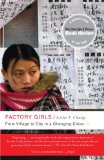Summary | Excerpt | Reviews | Beyond the Book | Readalikes | Genres & Themes | Author Bio

Critics' Opinion:
Readers' Opinion:
First Published:
Oct 2008, 432 pages
Paperback:
Aug 2009, 448 pages
 Book Reviewed by:
Book Reviewed by:
Karen Rigby
Buy This Book
She disliked school and did poorly. As long as she could remember, she was in
trouble. She climbed the neighbors' trees to steal their plums; if she was
caught she got a beating. Once when her mother ordered her to do chores, Min
refused. "There are so many people at home. Why do I have to do it?" Her mother
chased her for a quarter mile and hit her with a stick.
She was good at having fun. She learned how to swim and to drive a truck; she
loved roller-skating and hid her injuries from her mother. "I have fallen every
way there is to fall," Min said. "But you can't think about that." She was her
father's favorite. One summer, he rented a truck and she traveled the
countryside with him, selling watermelons from their farm. They drove during the
day and slept in the truck at night; it became one of Min's fondest memories.
Most migrants associated the place they came from with poverty and backwardness,
and some were even reluctant to say the name of their village. But long after
Min came to the city, she still talked about her hometown as if it were
something beautiful.
In the late 1990s, both of Min's parents went out to work to earn money for
their children's schooling. Her father worked in a shoe factory on the coast,
but poor health drove him back. Later her mother went out for a year. Min
boarded at a middle school in a nearby town but returned home every weekend to
cook and wash clothes for her father and the younger children.
Almost all the young people in her village had gone out. When Min was still in
middle school, her older sister, Guimin, went to work in a factory in Dongguan.
Soon after, Min failed the national high school entrance exam and her parents
considered having her go out, too. Guimin phoned home and urged them to keep Min
in school; Guimin's factory wages, she said, would help cover the tuition. Their
parents agreed, and Min enrolled in a two-year vocational high school. That made
her one of the most educated people in the village--more educated than Guimin,
who had sacrificed her own schooling to help the family.
Guimin came home for the 2003 lunar new year holiday and took Min away with her
when she left. Min had one more semester of school, but she wanted to save the
tuition and get a jump on the job hunt. She was thrilled to be leaving home; she
had never ridden on a train or seen a factory. "I wanted to get out early, learn
some things, and see the world," she said.
In Dongguan, Guimin rented a cheap hotel room for Min and found her a job in a
Japanese factory that made liquid crystal displays. Min worked there for a month
and left. She had never been in a place where she didn't know anyone, and she
was so lonely she couldn't bear it. She returned to the hotel and found a job at
another factory but didn't take it. Her sister offered to continue paying for
the hotel room, but Min felt herself becoming a burden. At a bus station, she
spotted a help-wanted flyer for a quality-control job on the assembly line of an
electronics factory. She dialed the number on the ad--many were just scams to
trick migrants out of their money--and the person who answered the phone gave
Min directions to the factory. It was a three-hour bus ride to the southeast tip
of Dongguan and Carrin Electronics, the place where Min spent her hard year
alone.
The minute she entered the factory grounds, Min realized the place was worse
than the Japanese factory she had just left behind. But it was too late to turn
back, and she did not want to ask her sister's help again. She was getting used
to being on her own--it was better that way.
Excerpted from Factory Girls by Leslie T. Chang Copyright © 2008 by Leslie T. Chang. Excerpted by permission of Spiegel & Grau, a division of Random House, Inc. All rights reserved. No part of this excerpt may be reproduced or reprinted without permission in writing from the publisher.





The House on Biscayne Bay
by Chanel Cleeton
As death stalks a gothic mansion in Miami, the lives of two women intertwine as the past and present collide.

The Flower Sisters
by Michelle Collins Anderson
From the new Fannie Flagg of the Ozarks, a richly-woven story of family, forgiveness, and reinvention.

The Funeral Cryer by Wenyan Lu
Debut novelist Wenyan Lu brings us this witty yet profound story about one woman's midlife reawakening in contemporary rural China.
Your guide toexceptional books
BookBrowse seeks out and recommends the best in contemporary fiction and nonfiction—books that not only engage and entertain but also deepen our understanding of ourselves and the world around us.